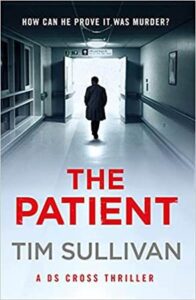 I’ve always written. I wrote and directed my first short film at university and the writing followed on from there. I began writing screenplays with some success, starting in the late eighties with an adaptation of Evelyn Waugh’s A Handful of Dust starring Kristen Scott-Thomas, James Wilby, Judi Dench and Alec Guinness. This was followed by an adaptation of EM Forster’s Where Angels Fear to Tread starring Helen Mirren, Helena Bonham-Carter and Judy Davis. I then wrote and directed Jack and Sarah with Richard E Grant, Samantha Mathis, Ian McKellen, Judi Dench and Eileen Atkins. This led to a screenwriting career in America where I worked with many producers including Ron Howard, Scott Rudin and Jeffrey Katzenberg. I spent a year writing the screenplay for Shrek 4 before the studio decided to go in a different direction with the movie. My last two produced movies were Letters to Juliet starring Amanda Seyfried and Vanessa Redgrave and last year My Little Pony – A new generation. I’ve always wanted to write novels, specifically crime and finally found the time. My series centres upon DS George Cross a socially awkward and sometimes difficult but brilliant detective. He is based in Bristol and has the best conviction rate in the force. His third outing The Patient is released by Head of Zeus on March 3rd.
I’ve always written. I wrote and directed my first short film at university and the writing followed on from there. I began writing screenplays with some success, starting in the late eighties with an adaptation of Evelyn Waugh’s A Handful of Dust starring Kristen Scott-Thomas, James Wilby, Judi Dench and Alec Guinness. This was followed by an adaptation of EM Forster’s Where Angels Fear to Tread starring Helen Mirren, Helena Bonham-Carter and Judy Davis. I then wrote and directed Jack and Sarah with Richard E Grant, Samantha Mathis, Ian McKellen, Judi Dench and Eileen Atkins. This led to a screenwriting career in America where I worked with many producers including Ron Howard, Scott Rudin and Jeffrey Katzenberg. I spent a year writing the screenplay for Shrek 4 before the studio decided to go in a different direction with the movie. My last two produced movies were Letters to Juliet starring Amanda Seyfried and Vanessa Redgrave and last year My Little Pony – A new generation. I’ve always wanted to write novels, specifically crime and finally found the time. My series centres upon DS George Cross a socially awkward and sometimes difficult but brilliant detective. He is based in Bristol and has the best conviction rate in the force. His third outing The Patient is released by Head of Zeus on March 3rd.
What is your writing process?
I’m a morning writer. I find I get my best work done then. Ideas seem fresher and I have the energy to get going. I tend to re-read and edit in the afternoons.
Do you plan or just write?
With screenplays I definitely plan. You have to. But with crime novels I start knowing who has died and who’s done it, but I have no idea how to get there. This can make things complicated and it’s easy to lose faith when you’re not sure which way to go. But I think it means that George Cross, the audience and I are all discovering things at the same time. I think this gives the narrative a more convincing and interesting path.
What about word count?
This varies enormously. I write everything long hand in fountain pen before it gets anywhere near a computer. So, a minimum of 500 words and a maximum of around 2500.
What do you find hard about writing?
The beginning of a book is hard. Until I’ve reached 20,000 words I’m not really sure whether it’s going to be a book at all. I enjoy it a lot more after that. I find it hard not to write long meandering sentences but thankfully I have an eagle-eyed editor who keeps me on the straight and narrow or should I say within the margins.
What do you love about writing?
I used to find the solitary nature of it hard but now it’s possibly what I love about it the most
I love creating characters and relationships. Writing things that move me or make me laugh.
It’s amazing how many times as a writer you can surprise yourself.
Advice for other writers.
Find the confidence to do it and sit down and write. Write for yourself before you write for anyone else. Sketch down ideas and scenes. Write clutches of dialogue as they come into your head. Don’t sit down and try and write a complete project. Play around a little.
And enjoy it. Everyone writes better when they enjoy what they’re doing.
Instagram @timsullivannovellist
Twitter @timjrsullivan
Facebook @timjrsullivan
Tim Sullivan is the author of The Patient published by Head of Zeus 3rd March, £18.99


